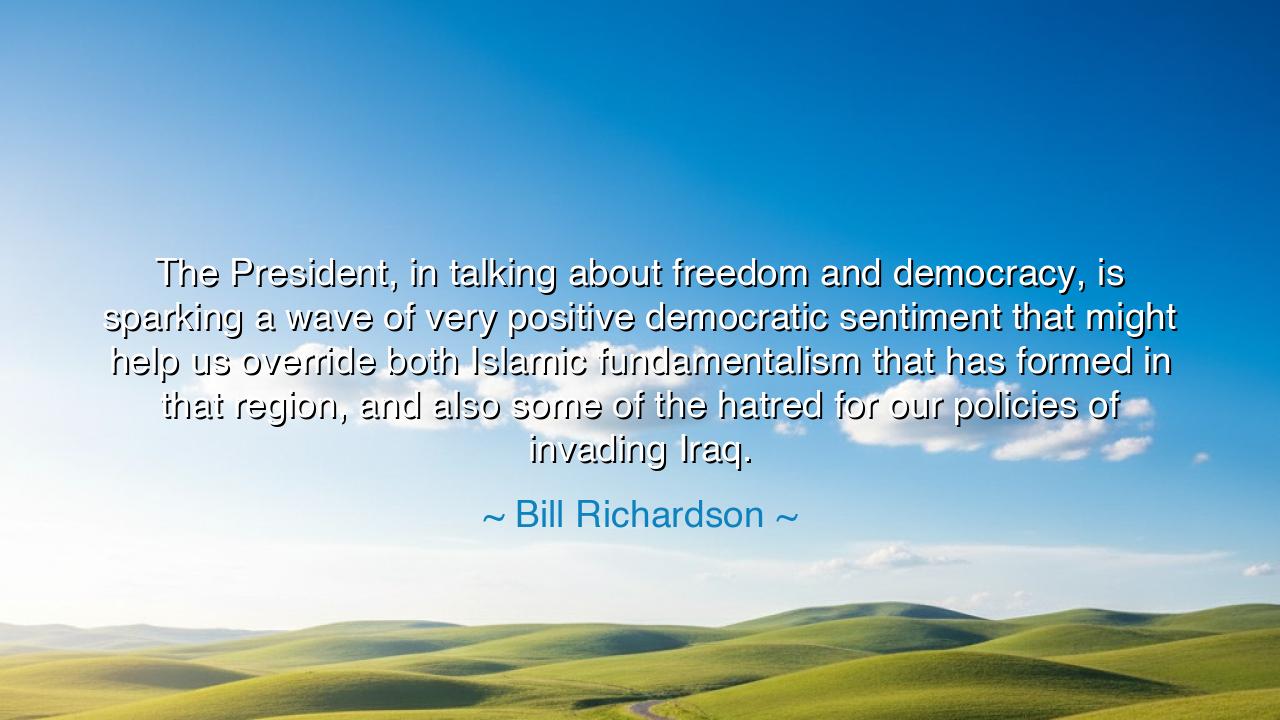
The President, in talking about freedom and democracy, is
The President, in talking about freedom and democracy, is sparking a wave of very positive democratic sentiment that might help us override both Islamic fundamentalism that has formed in that region, and also some of the hatred for our policies of invading Iraq.






Bill Richardson, a statesman who weighed both diplomacy and conscience, once declared: “The President, in talking about freedom and democracy, is sparking a wave of very positive democratic sentiment that might help us override both Islamic fundamentalism that has formed in that region, and also some of the hatred for our policies of invading Iraq.” In this saying lies both hope and burden. He speaks of freedom and democracy as flames that can inspire, yet he acknowledges also the shadow cast by war and resentment. His words reveal the paradox of power—that noble ideals may be proclaimed even as trust is strained.
The essence of his teaching is this: words have power. When a leader lifts the banner of democracy, he is not merely making speeches; he is sowing seeds in the hearts of distant peoples. These seeds may take root, becoming movements of change stronger than armies. Yet at the same time, hypocrisy—when ideals are preached but policies bring harm—can turn admiration into hatred. Richardson, in his wisdom, saw that the fate of nations depends on whether the words of freedom are matched by actions that honor them.
History gives us a mirror in the tale of Woodrow Wilson, who after the First World War spoke of “making the world safe for democracy.” His words stirred hope across Europe and beyond, inspiring small nations to dream of independence. Yet when treaties failed to match the lofty promises, bitterness and mistrust grew, paving the way for new conflicts. So too with the invasion of Iraq—a policy that, though justified by some as liberation, was remembered by many as domination. Richardson’s words remind us that ideals, to remain powerful, must be clothed in integrity.
There is also a lesson in his recognition of positive democratic sentiment as a force against extremism. Hatred and fundamentalism thrive where despair rules; but when people are given a voice, when they taste the dignity of self-rule, the soil for extremism dries. Thus, he declares that democracy is not merely a political system, but a remedy against chaos, a light strong enough to scatter shadows of fear and rage.
Let this wisdom endure: when nations speak of freedom, let their actions reflect its spirit; when they invoke democracy, let their policies embody fairness and respect. For words are fire—they can illuminate or they can burn. Richardson’s teaching to future generations is clear: only when words and deeds unite will the wave of democratic sentiment endure, overcoming both the chains of fanaticism and the bitterness of betrayal.






NCNem chua
The idea that democratic sentiment could be the antidote to both Islamic fundamentalism and hatred for U.S. policies is an interesting perspective, but does it truly consider the complexity of the Middle East’s political and social climate? Can we rely solely on the idea of freedom and democracy to heal divisions, or do we need a more nuanced understanding of the historical, cultural, and political factors at play here?
HNHuynh Nhu
Bill Richardson’s statement seems optimistic in suggesting that the promotion of freedom could override long-standing issues like Islamic fundamentalism and the anger surrounding Iraq. But do we risk oversimplifying the situation by thinking that democracy can solve everything? Isn’t it just as important to acknowledge the ways in which U.S. foreign policy and military interventions may have fueled this anger and fundamentalism in the first place?
TQNguyen Trong Quy
The notion that promoting freedom and democracy could help mitigate fundamentalism and negative sentiment toward U.S. policies is appealing, but is it realistic? In regions with deep historical and ideological conflicts, how effective are these efforts in truly changing minds or addressing the root causes of extremism? Shouldn’t we also be focusing on more inclusive diplomatic efforts to genuinely address concerns in the Middle East?
PTPHAT TRUONG
Richardson’s idea that promoting democracy could be a way to combat Islamic fundamentalism and opposition to U.S. policies raises a valid question: is the spread of democracy always the solution? While it's noble to encourage freedom, do we fully understand the complex cultural, political, and religious factors that contribute to the rise of extremism in the region? Can a 'one-size-fits-all' approach of democracy actually address these deeply embedded issues?
TNNgo Thi Thanh Ngan
Bill Richardson’s statement brings up an interesting point about the potential for democratic sentiment to counteract extremism. But can the simple promotion of freedom and democracy really override deep-rooted issues like Islamic fundamentalism and resentment from military interventions, such as the invasion of Iraq? While democratic ideals are important, how do we address the underlying grievances that fuel both extremism and anti-Western sentiment?